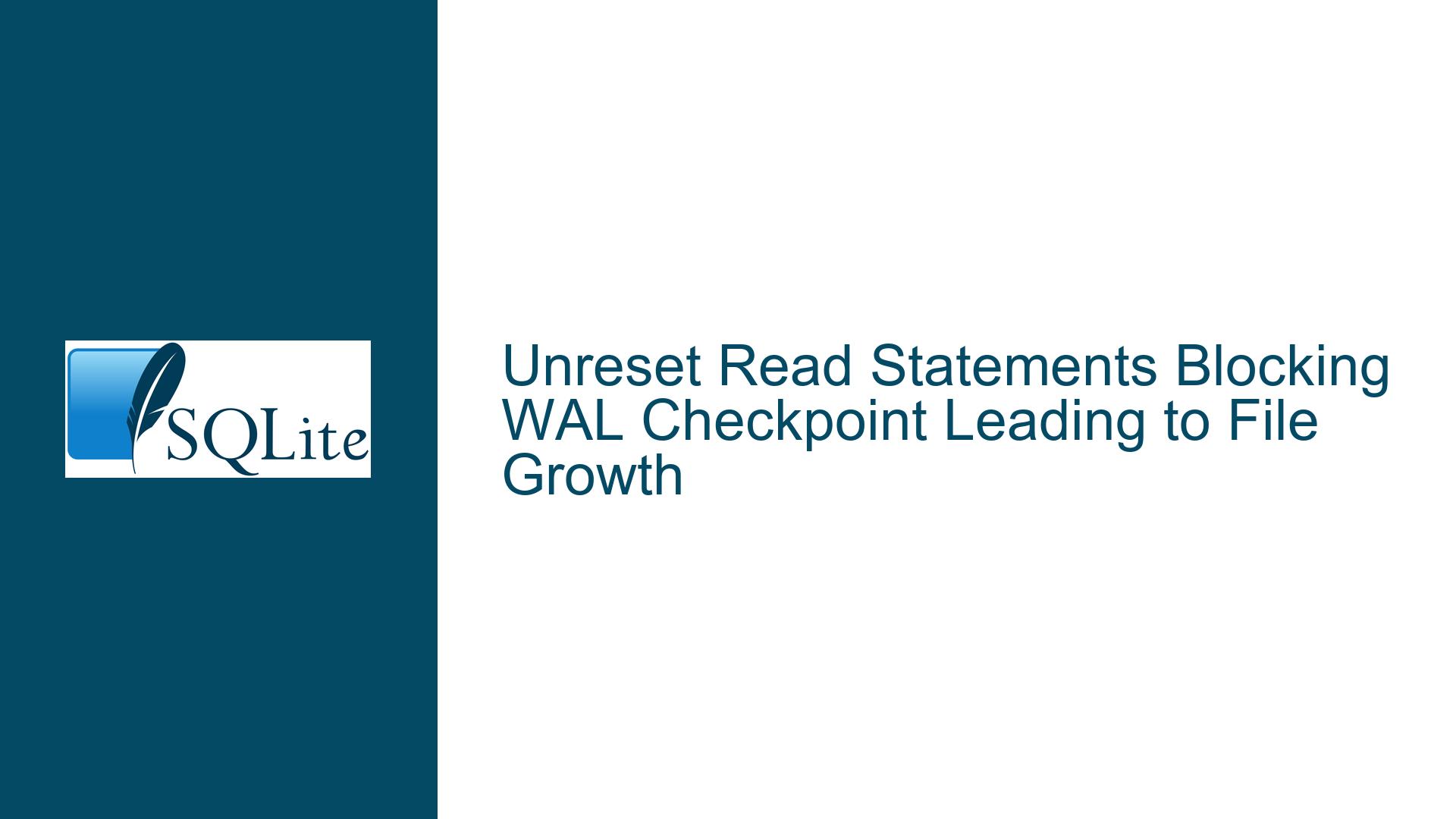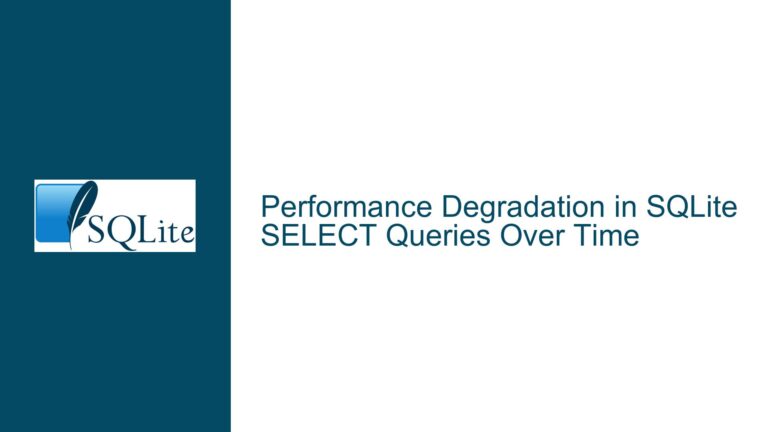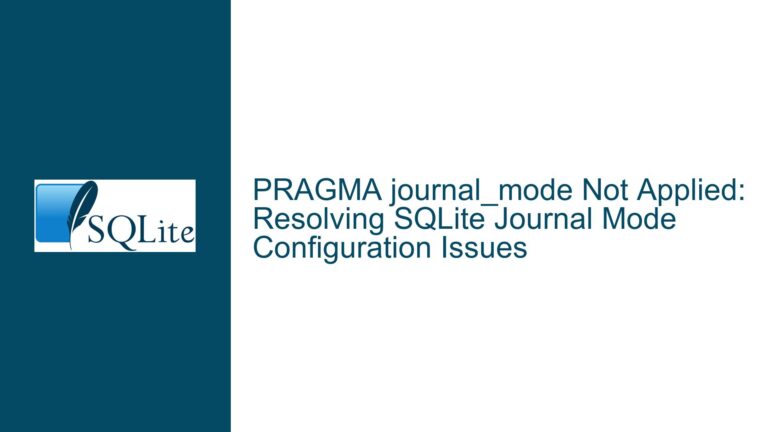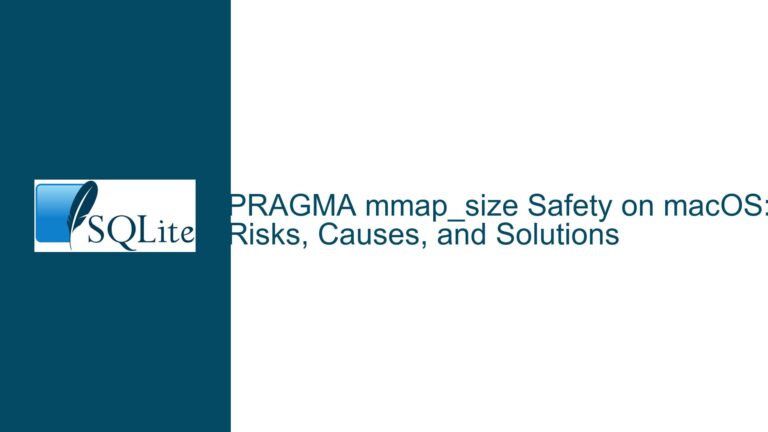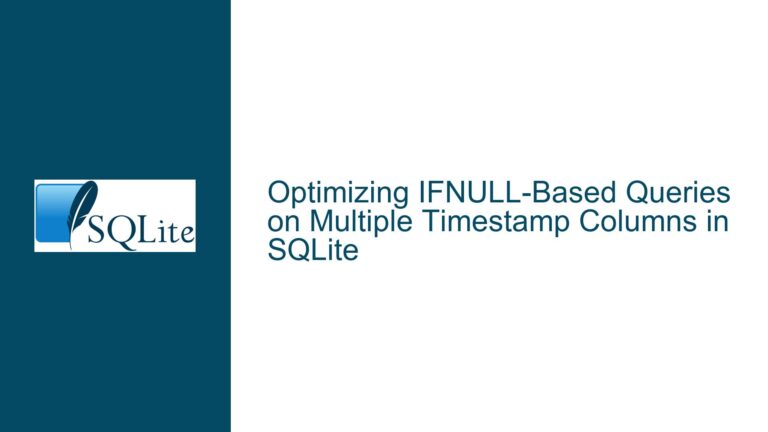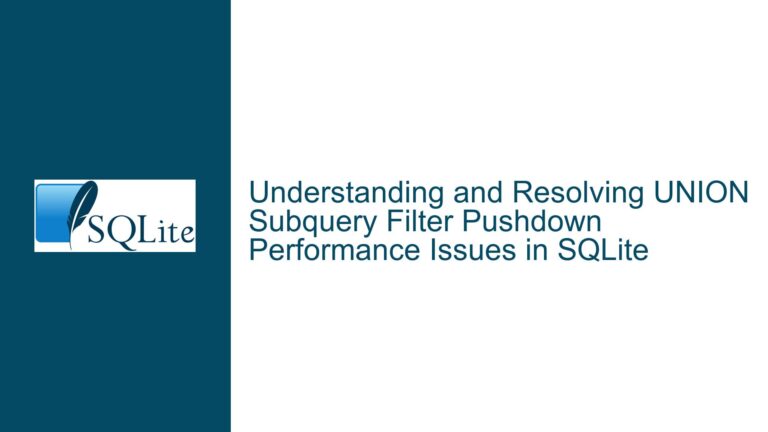Unreset Read Statements Blocking WAL Checkpoint Leading to File Growth
Transaction Read-State Retention Preventing WAL Truncation
Core Mechanism Breakdown
The fundamental issue revolves around SQLite’s Write-Ahead Log (WAL) mode behavior when long-running read operations coexist with write transactions. When a prepared SELECT statement remains in an unfinished state (not reset/finalized) while subsequent INSERT/UPDATE transactions execute, the WAL file grows beyond the configured autocheckpoint threshold (default 1000 pages/4MB). This occurs because:
WAL Checkpoint Dependencies: Automatic checkpoints require all existing database readers to advance beyond the checkpoint target frame. An open read cursor creates a "read mark" that blocks checkpoint progression.
Statement Lifecycle Management: SQLite considers a prepared statement active until explicit reset/finalization, even after sqlite3_step() returns SQLITE_ROW. The RAII wrapper in the example delays statement reset until destruction rather than immediate release after data retrieval.
Transaction Scope Contention: The SELECT MAX() operation initiates an implicit read transaction that persists until statement reset. Subsequent write transactions create new WAL frames that cannot be checkpointed while the initial read remains active.
Critical Threshold Interactions
WAL Index Shard Boundaries: Each 4KB page in the WAL corresponds to a database page. The 1000-page autocheckpoint threshold translates to ~4MB (1000*4096). Unreleased read operations force WAL growth in quantized chunks matching transaction boundaries.
Busy Handlers & Lock Escalation: Pending checkpoints retry automatically during write transactions via SQLITE_BUSY_SNAPSHOT handling. Persistent read statements convert transient locks into long-term shared locks that prevent exclusive access required for checkpoint completion.
Memory-Mapped I/O Impact: WAL files memory-map their content through the SQLITE_FCNTL_MMAP_SIZE interface. Oversized WAL files increase virtual memory pressure and reduce page cache efficiency for concurrent operations.
WAL Growth Catalysts from Improper Statement Handling
Active Read Cursor Retention
The prepared SELECT MAX() statement maintains an open cursor after retrieving the first SQLITE_ROW result. Though the application logic only consumes the first row, SQLite retains the statement’s read position until explicit reset. This creates:
Persistent Read Transaction: Even without explicit BEGIN/COMMIT, SQLite maintains snapshot isolation through statement-level read markers. The database connection remains in "read mode" until all statements release their locks.
Checkpoint Horizon Blockage: WAL checkpointing uses a sliding window approach where the earliest active read transaction defines the minimum WAL frame that can be recycled. Unreset statements anchor this horizon at their initial read position.
Page Version Accumulation: Each write transaction after the open read must preserve all modified pages in WAL frames since the read statement’s start point. This creates exponential WAL growth proportional to write frequency.
RAII-Induced Reset Delay
The C++ prepared_statement class’ destructor-driven finalization creates temporal gaps between logical operation completion and resource release:
Destruction Order Dependencies: Stack-unwinding sequence determines when statements get reset. In nested scopes or complex control flows, this may leave statements active longer than necessary.
Exception Safety Tradeoffs: While RAII ensures eventual cleanup, it prioritizes exception safety over immediate resource release. This conflicts with WAL’s checkpointing requirements that demand prompt read transaction closure.
Batch Operation Interference: The example’s loop inserting 20 records compounds the problem – each iteration creates new WAL entries while the initial SELECT’s read transaction remains open.
Auto-Checkpoint Trigger Limitations
SQLite’s automatic checkpointing exhibits critical behavioral constraints:
Passive Checkpoint Mode: Auto-checkpoints use SQLITE_CHECKPOINT_PASSIVE, which aborts if any readers are active. This contrasts with RESTART/TRUNCATE modes that force reader disconnection.
Write Transaction Coupling: Checkpoints only trigger during COMMIT operations. Frequent small transactions create more checkpoint attempts (and failures) compared to batched writes.
Frame Count vs Size: The autocheckpoint threshold counts WAL frames (pages), not bytes. Large database pages (e.g., 64KB) still use 1 frame count per page, making WAL size management page-size dependent.
WAL Size Mitigation Through Statement Lifecycle Control
Immediate Read Transaction Closure
Forcing read statement finalization before write operations:
// Original problem code:
max_pk_getter.step(true);
int const max_pk = sqlite3_column_int(max_pk_getter.handle(), 0);
// Fix: Explicit reset after data retrieval
max_pk_getter.step(true);
int const max_pk = sqlite3_column_int(max_pk_getter.handle(), 0);
sqlite3_reset(max_pk_getter.handle()); // Release read lock immediately
Mechanism Analysis:
- Resetting the statement moves the database connection from "read" state to "idle"
- Releases the shared lock held since the SELECT began
- Allows subsequent checkpoint operations to process all WAL frames up to current write head
Implementation Considerations:
- Place resets in same scope as data retrieval to prevent statement reuse errors
- Validate statement state before reset to avoid SQLITE_MISUSE
- Use sqlite3_stmt_readonly() to identify read statements needing aggressive reset
Write Transaction Isolation Techniques
Separating read and write operations into distinct transactional boundaries:
// Before write loop
sqlite3_exec(db, "BEGIN IMMEDIATE", 0, 0, 0);
// Perform inserts
sqlite3_exec(db, "COMMIT", 0, 0, 0);
IMMEDIATE Transaction Benefits:
- Acquires reserved lock upfront, preventing concurrent reads from blocking checkpoint
- Forces transaction serialization, eliminating WAL version stack buildup
- Reduces total WAL frames through atomic batch commits
Tradeoff Considerations:
- Increased contention in multi-connection scenarios
- Potential deadlocks if application logic has complex read/write interleaving
- Higher latency per transaction due to exclusive lock acquisition
Checkpoint Forcing Strategies
Manual checkpoint invocation after critical write operations:
// After bulk inserts
int logFrameCount, checkpointedFrameCount;
sqlite3_wal_checkpoint_v2(db, "main", SQLITE_CHECKPOINT_TRUNCATE,
&logFrameCount, &checkpointedFrameCount);
Checkpoint Mode Options:
- TRUNCATE: Blocks until all readers disconnect, then truncates WAL to zero
- RESTART: Similar to TRUNCATE but preserves WAL header for faster reuse
- PASSIVE: Default auto-checkpoint behavior, aborts on reader contention
Implementation Caveats:
- Requires SQLITE_CHECKPOINT_RESTART/TRUNCATE to override reader blocks
- May introduce application latency during checkpoint I/O
- Needs error handling for SQLITE_BUSY and SQLITE_LOCKED conditions
Prepared Statement Lifecycle Optimization
Modifying the RAII wrapper to enable earlier resets:
class SafePreparedStatement {
sqlite3_stmt* stmt;
public:
explicit SafePreparedStatement(sqlite3* db, const char* sql) {
sqlite3_prepare_v2(db, sql, -1, &stmt, nullptr);
}
// Proactive reset method
void resetNow() {
sqlite3_reset(stmt);
sqlite3_clear_bindings(stmt);
}
~SafePreparedStatement() {
sqlite3_finalize(stmt);
}
// ... step()/other methods ...
};
// Usage:
{
SafePreparedStatement maxPkStmt(db, "SELECT MAX(...)");
maxPkStmt.step();
// ... use data ...
maxPkStmt.resetNow(); // Explicit reset before write phase
} // Destructor still safe if resetNow() already called
Design Advantages:
- Allows targeted reset timing without sacrificing exception safety
- Maintains single ownership semantics for prepared statements
- Clearer resource lifecycle through named reset method
Connection-Level Checkpoint Tuning
Adjusting WAL parameters to accommodate application behavior:
PRAGMA journal_size_limit = 4194304; -- 4MB hard cap
PRAGMA wal_autocheckpoint = 500; -- More frequent checkpoint attempts
PRAGMA synchronous = NORMAL; -- Reduce fsync() frequency
Parameter Tradeoffs:
- Lower wal_autocheckpoint increases checkpoint frequency but may impact write throughput
- journal_size_limit introduces hard WAL truncation at cost of possible SQLITE_FULL errors
- synchronous=NORMAL improves performance but risks partial writes on power loss
Application Architecture Modifications
Structural changes to prevent read/write interference:
Reader/Writer Connection Separation:
- Dedicated read-only connection for SELECT statements
- Write connection uses immediate transactions exclusively
- Enables independent checkpoint management per connection
Batch Write Optimization:
- Buffer multiple inserts into single transaction
- Reduces total WAL frames generated
- Lowers checkpoint attempt frequency
Asynchronous Checkpoint Thread:
- Background thread calling sqlite3_wal_checkpoint()
- Allows main thread to continue without blocking on I/O
- Requires mutex protection around database handle access
Diagnostic Tooling Integration
Implementing WAL monitoring to detect growth early:
// Periodic WAL size check
auto GetWalSize(sqlite3* db) {
int64_t pages = 0;
sqlite3_file_control(db, "main", SQLITE_FCNTL_WAL_BLOCK, &pages);
return pages * sqlite3_uri_int64(sqlite3_db_filename(db, "main"),
"page_size", 4096);
}
// Set up periodic check
std::thread watchdog([db] {
while (true) {
if (GetWalSize(db) > 4'194'304) { // 4MB
AlertAdmin("WAL size exceeded threshold!");
}
std::this_thread::sleep_for(10s);
}
});
Advanced Diagnostics:
- sqlite3_db_status(SQLITE_DBSTATUS_WAL_SIZE) for real-time WAL monitoring
- SQLITE_FCNTL_WAL_BLOCK to measure uncheckpointed WAL pages
- sqlite3_uri_int64() with "wal_autocheckpoint" parameter to verify settings
Transactional Semantics Enforcement
Guaranteeing read transactions don’t overlap writes through SQL schema design:
-- Force exclusive access for writes
CREATE TRIGGER DataWriteLock BEFORE INSERT ON Data
BEGIN
SELECT CASE WHEN (SELECT COUNT(*) FROM Data) > 0
THEN RAISE(ABORT, 'Concurrent writes prohibited')
END;
END;
Lock Escalation Techniques:
- STRICT tables to prevent loose type checking overhead
- WITHOUT ROWID tables for clustered index storage (reduces page splits)
- Application-level mutexes around critical write sections
SQLite Configuration Hardening
Custom VFS implementation to enforce strict WAL policies:
// Custom VFS that monitors WAL growth
static int xFileControl(sqlite3_file *pFile, int op, void *pArg) {
if (op == SQLITE_FCNTL_WAL_BLOCK) {
int64_t* pages = static_cast<int64_t*>(pArg);
if (*pages > 1000) {
return SQLITE_FULL; // Force checkpoint or abort
}
}
return SQLITE_OK;
}
// Register custom VFS before database open
sqlite3_vfs_register(&gStrictWalVfs, 1);
VFS Customization Points:
- xShmLock/xShmBarrier for shared memory control
- xFileSize to virtualize WAL size reporting
- xSync hooks to intercept fsync() operations
Concurrency Model Alternatives
Replacing WAL mode with alternative journaling when appropriate:
// For single-connection apps
sqlite3_exec(db, "PRAGMA journal_mode=TRUNCATE", 0, 0, 0);
Journal Mode Tradeoffs:
- DELETE: Traditional rollback journal, no WAL issues but slower concurrency
- MEMORY: Journal in RAM – riskier but avoids filesystem WAL entirely
- OFF: No crash safety – only suitable for transient data
Bind Parameter Optimization
Reducing statement reset overhead through proper binding:
// Optimal parameter reuse
sqlite3_stmt* stmt;
sqlite3_prepare_v2(db, "INSERT INTO Data VALUES(?,?)", -1, &stmt, 0);
for (int i = 0; i < 1000; ++i) {
sqlite3_reset(stmt);
sqlite3_bind_int(stmt, 1, i);
sqlite3_bind_text(stmt, 2, data, -1, SQLITE_STATIC);
sqlite3_step(stmt);
}
// Single finalize after loop
Binding Best Practices:
- Use SQLITE_STATIC when data persists beyond bind call
- Prefer sqlite3_clear_bindings() for statement reuse
- Batch bind operations to minimize VM reinitialization
Legacy Code Mitigation Patterns
Incremental refactoring for systems requiring gradual fixes:
Statement Finalization Auditing:
- Instrument sqlite3_finalize() with logging
- Track statement lifetime through unique IDs
- Generate heatmaps of long-lived statements
Connection Pool Wrapping:
class CheckpointingConnectionPool { std::mutex poolMutex; std::vector<sqlite3*> idleConns; sqlite3* getConnection() { std::lock_guard<std::mutex> lk(poolMutex); if (idleConns.empty()) return OpenNewConnection(); sqlite3* conn = idleConns.back(); idleConns.pop_back(); sqlite3_wal_checkpoint(conn, nullptr); // Pre-use checkpoint return conn; } void returnConnection(sqlite3* conn) { sqlite3_wal_checkpoint(conn, nullptr); // Post-use checkpoint std::lock_guard<std::mutex> lk(poolMutex); idleConns.push_back(conn); } };Static Analysis Rules:
- Clang-Tidy checks for sqlite3_step()/sqlite3_reset() pairing
- CodeQL queries detecting unreleased prepared statements
- Custom compiler attributes to tag SQL statement handles
Performance/Integrity Verification Suite
Automated testing strategy to prevent regression:
TEST(WALGrowthTest) {
TempDatabase db;
// Initialize with schema
// Run suspect operations
int64_t walSize = GetWalSize(db.handle());
ASSERT_LT(walSize, 4'194'304);
// Verify checkpointing occurred
ASSERT_EQ(sqlite3_wal_checkpoint(db.handle(), nullptr), SQLITE_OK);
}
Test Coverage Targets:
- Interleaved read/write statement sequences
- Connection pool exhaustion scenarios
- Crash recovery with oversized WAL files
- Multi-threaded contention patterns
SQLite Version-Specific Behavior Handling
Addressing differences across SQLite releases:
3.31.0+ wal_autocheckpoint Enhancements:
- Improved checkpoint scheduling logic
- More aggressive auto-checkpoint retries
- Requires testing with actual deployment targets
Pre-3.7.0 Compatibility:
- WAL mode unavailable, must use legacy journaling
- Not applicable to modern systems but crucial for embedded legacy
3.38.0+ DQSEL Enhancements:
- Deferred query shutdown optimizations
- May alter statement reset timing requirements
- Test with SQLITE_DBCONFIG_DQSEL to compare behaviors
Production-Grade Recovery Protocols
Emergency procedures for oversized WAL scenarios:
- Graceful WAL Reset:
sqlite3 problem.db "PRAGMA wal_checkpoint(TRUNCATE);" - Offline Database Repair:
echo "VACUUM;" | sqlite3 corrupted.db -bail - WAL File Recycling:
- Close all database connections
- Delete -wal/-shm files
- Reopen with journal_mode=DELETE then WAL
Risk Mitigation:
- Always backup original files before recovery attempts
- Use .dump/.restore for structural integrity preservation
- Validate checksums with PRAGMA integrity_check
